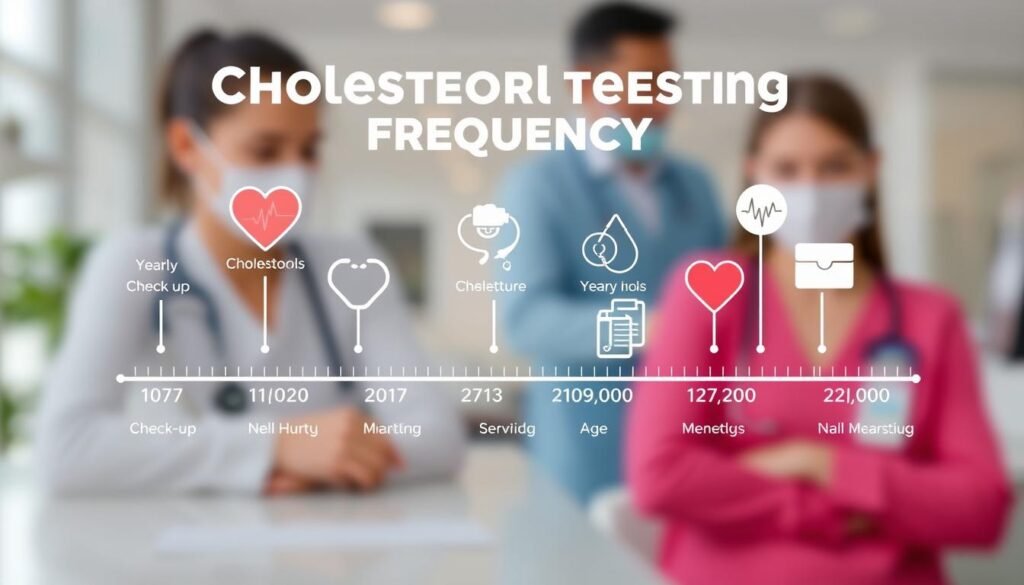Ever wondered about your cholesterol levels and your heart’s health? Knowing when to check your cholesterol is crucial. Regular checks help us understand heart risks better. It’s a vital step in stopping heart disease. This guide will show you the importance of cholesterol tests. You’ll learn how these tests keep your heart healthy.
Key Takeaways
- Regular cholesterol testing is crucial for assessing cardiovascular risk.
- Understanding lipid profiles helps in heart disease prevention.
- Knowing when to get tested empowers individuals to take control of their health.
- Early detection of abnormal cholesterol levels can save lives.
- Adopting a healthier lifestyle can positively impact cholesterol levels.
- Awareness of testing guidelines can lead to earlier interventions.
Introduction to Cholesterol and Its Importance
Cholesterol is a waxy substance in our bodies that helps us stay healthy. The liver makes it, and it’s vital for making cell membranes and hormones. Knowing about cholesterol is key to keeping our hearts healthy.
Cholesterol comes in two main types: LDL and HDL. LDL, or “bad” cholesterol, can build up in arteries and cause heart issues. HDL, or “good” cholesterol, helps clear LDL from the blood, making your lipid profile healthier.
It’s important to keep these cholesterol types in balance for good health. Checking your cholesterol levels often can guide your lifestyle choices. Learning about cholesterol’s role in heart health can motivate us to take action, avoiding serious problems later.
Understanding Cholesterol Levels
It’s crucial to know about cholesterol for heart health. Cholesterol is a fatty substance in our blood. It’s important for body functions. We need to watch different cholesterol types, like LDL (bad) and HDL (good).
What Are LDL and HDL Cholesterol?
LDL cholesterol is the “bad” kind. It can build up plaque in arteries. High LDL raises heart disease and stroke risks. It’s best kept below 100 mg/dL.
HDL cholesterol is the “good” kind. It helps clear bad cholesterol from your blood. High HDL means lower heart disease risk. Aim for over 60 mg/dL for HDL.
The Role of Triglycerides in Heart Health
Triglycerides are fats in our blood, too. High triglycerides with high LDL or low HDL up heart disease risk. It’s crucial to keep them under 150 mg/dL. Balance LDL, HDL, and triglycerides for heart health.
https://www.youtube.com/watch?v=ZleQ6zCm1n4
Cholesterol Testing Guidelines
Understanding cholesterol testing guidelines is key for heart health. Regular checks spot risks linked with high cholesterol. The lipid profile test checks various cholesterol types and triglyceride levels, crucial for heart health evaluation. These tests shed light on overall health and help make smart health choices.
Overview of Lipid Profile Tests
A lipid profile tests for:
- Low-Density Lipoprotein (LDL): Known as “bad” cholesterol, high amounts can cause plaque to build up in arteries.
- High-Density Lipoprotein (HDL): This “good” cholesterol, when high, can lower the risk of heart disease.
- Triglycerides: High levels can increase heart disease risk along with other factors.
It’s recommended to get these tests regularly, starting in childhood. Lipid profile results are key in identifying risks and planning for lifestyle changes or treatments.
Interpreting Your Cholesterol Test Results
Cholesterol test results can be tricky to understand. Generally, doctors categorize them as:
| Type of Cholesterol | Optimal Level | Borderline High | High |
|---|---|---|---|
| LDL | Less than 100 mg/dL | 100-129 mg/dL | 130 mg/dL and above |
| HDL | 60 mg/dL and above | 40-59 mg/dL | Less than 40 mg/dL |
| Triglycerides | Less than 150 mg/dL | 150-199 mg/dL | 200 mg/dL and above |
Talking to a healthcare provider is crucial to understand cholesterol tests. They offer advice tailored to your health needs. For more on cholesterol testing, check out this resource.
When Should You Get Checked?
Knowing when to get your cholesterol checked is key for your heart’s health. Following the suggested schedule for tests can catch issues early. Age guidelines tell you when to begin and the frequency of your screenings based on health and other factors.
Age and Frequency of Testing
Experts usually say adults should start cholesterol screenings at 20. If you face issues like obesity, diabetes, or high blood pressure, you might need to start earlier. How often you test can change, depending on your first test results:
| Cholesterol Levels | Suggested Testing Frequency |
|---|---|
| Optimal (less than 200 mg/dL) | Every 5 years |
| Borderline High (200-239 mg/dL) | Every 1-2 years |
| High (240 mg/dL and above) | Every year |
Risk Factors That Influence Testing Schedules
Some people need to test their cholesterol more often. Important risk factors include:
- Family history of heart disease
- High blood pressure
- Diabetes
- Smoking habits
- Sedentary lifestyle
Knowing your risk factors helps you decide how often to check your cholesterol. It ensures you get help quickly if you need it.

Screening Recommendations for Different Age Groups
Screening varies for kids, teens, and adults. Knowing when to check is key to staying healthy. This is because cholesterol levels can affect well-being. Each group has its own guidelines for testing, to catch any issues early.
Children and Adolescents
Kids and teens should get a cholesterol test between ages 9 and 11, and then between 17 and 21. These checks can find early signs of heart disease. The American Academy of Pediatrics says to screen those with high cholesterol in their family or heart disease. Kids showing obesity or at risk should also be screened.
Adults: Starting at Age 20
Adults should start getting checks at 20, regularly. The advice is to check cholesterol every four to six years, based on risk factors. Those with a higher chance of problems might need tests more often. Things like your own health, family history, and how you live influence these suggestions.
| Age Group | Screening Age | Frequency of Testing | Risk Factors |
|---|---|---|---|
| Children | 9-11 | Every 3-5 years | Family history, obesity |
| Adolescents | 17-21 | Every 3-5 years | Family history, poor diet |
| Adults | 20 and above | Every 4-6 years | Age, family history, lifestyle |
Understanding Cardiovascular Risk
High cholesterol levels are a big risk for heart health. Specifically, too much LDL cholesterol and triglycerides can cause atherosclerosis. This makes arteries narrow and limits blood flow. Knowing this link helps stop heart problems before they start.
How High Cholesterol Affects Your Heart
Too much LDL cholesterol leads to plaque in your arteries. This can cause arteries to become stiff and narrow. It puts more pressure on your heart and can lead to heart diseases.
The Link Between Cholesterol and Heart Disease
Many studies show that high cholesterol and heart disease are connected. Lowering cholesterol can cut the risk of heart attacks and make your heart healthier. It’s important to keep an eye on your cholesterol levels. Making changes in your lifestyle, like eating better and exercising, can help control cholesterol.

| Cholesterol Type | Impact on Heart Health | Recommended Levels |
|---|---|---|
| LDL (Low-Density Lipoprotein) | Increases cardiovascular risk | Less than 100 mg/dL |
| HDL (High-Density Lipoprotein) | Protective against heart disease | 50 mg/dL or higher |
| Triglycerides | Elevated levels indicate high cardiovascular risk | Less than 150 mg/dL |
Lifestyle Modifications to Manage Cholesterol
Effective cholesterol management often means making big lifestyle changes. People can eat better and exercise more. These actions help control cholesterol and keep the heart healthy.
Dietary Changes for Healthier Cholesterol Levels
To improve cholesterol, making smart food choices is key. Here are the main changes:
- Increasing fiber intake by consuming whole grains, fruits, and vegetables.
- Reducing saturated fats found in red meat and full-fat dairy products.
- Incorporating heart-healthy fats, such as olive oil and avocados, into meals.
Adopting these eating habits can greatly improve your cholesterol. It leads to better heart health.
The Role of Exercise in Cholesterol Management
Exercise is also crucial for keeping cholesterol in check. Regular activity lowers bad cholesterol and ups good cholesterol. You might want to try:
- Cardiovascular activities like walking, jogging, swimming, or cycling.
- Strength training exercises that build muscle and boost metabolism.
- Incorporating physical activity into daily life, such as taking the stairs or gardening.
Making exercise a regular part of life can boost heart health. It helps with managing cholesterol effectively.
| Activity Type | Benefits for Cholesterol |
|---|---|
| Cardiovascular Exercise | Increases HDL cholesterol levels and improves heart health. |
| Strength Training | Helps lower LDL cholesterol and supports weight management. |
| Daily Physical Activities | Can lead to small, consistent improvements in cholesterol and overall health. |
Cholesterol-Lowering Medications
Cholesterol-lowering medications are key for those at high risk of heart disease. Knowing about drugs like statins is crucial. Statins are the most prescribed drugs for lowering bad cholesterol.
Common Types of Cholesterol Medications
Here are some common types of cholesterol meds and how they work:
- Statins: These block an enzyme that makes cholesterol, greatly reducing bad cholesterol levels.
- Bile acid sequestrants: These grab onto bile acids so your liver needs to use cholesterol to make more.
- Cholesterol absorption inhibitors: These stop your intestines from taking in cholesterol from food, lowering your cholesterol numbers.
- PCSK9 inhibitors: A new type, they help your liver get rid of bad cholesterol from your blood.
When to Consider Medication
Knowing when to start these meds depends on your cholesterol and risk factors. Doctors suggest considering meds when:
- LDL cholesterol is above 190 mg/dL.
- You have heart disease or diabetes, no matter your LDL.
- You have many risk factors for heart disease.
Talk to your doctor to understand your risks and if meds are right for you. The right treatment is based on your health history and cholesterol levels. For more info, check the treatment guidelines.
Monitoring Your Cholesterol Levels
Ongoing monitoring of cholesterol is crucial for heart health. Regular tests are key to spotting any changes early. They help gauge if lifestyle shifts or medicines are working.
Importance of Regular Testing
Testing often helps people track their heart health. It lets doctors check if treatments are effectively lowering cholesterol. The National Heart, Lung, and Blood Institute advises those at risk to get regular tests.
Keeping Track of Lifestyle Changes
Writing down your diet and exercise habits is smart. It helps you and your doctor see what’s working. This info lets you make the best health decisions, steering your cholesterol levels right.
Innovations in Cholesterol Testing
Recent cholesterol testing innovations have changed how we check heart health. These new methods focus on being accurate and easy to use. They help people achieve better health outcomes.
Now, there are home testing kits for checking lipid levels. People can use these kits easily and in private. They offer a quick way to know your cholesterol levels without going to a lab. This makes it easy for everyone to keep track of their health.
There have also been improvements in how labs test for cholesterol. These advances make the test results more precise. This means doctors can give better advice and treatments. By using these new methods, healthcare providers can diagnose and treat health issues more accurately.
The American College of Cardiology started a campaign to spread the word about these screening guidelines. They want to make sure patients get the best care possible. With these new tools, checking cholesterol is easier and more accurate for everyone.

Potential Barriers to Getting Tested
Many people find it hard to get their cholesterol checked. They face challenges that stop them from testing. One big issue is not knowing about the testing guidelines. A lot of people don’t know they should get checked regularly. Public health efforts are key to raising this awareness.
Lack of Awareness About Guidelines
Not knowing when to get a cholesterol test is common. People often don’t understand healthcare resources well. Teaching them about the guidelines could encourage them to look after their health. This could lead to better handling of cholesterol. Having good information on cholesterol risks is crucial, as research shows.
Access to Healthcare Services
Getting access to healthcare services is another hurdle. Money issues or not enough doctors can keep people from testing. In some places, it’s hard to get the health services needed. This makes checking cholesterol levels less frequent. Programs that make healthcare more accessible are important. They help people get the tests they need, as guidelines suggest.
Conclusion
Knowing about cholesterol tests is key for heart health. Regular screenings help find risks early, leading to better health protection. This piece covered the important points on cholesterol testing, including its critical role.
Make health screenings a normal part of life. This means watching your cholesterol and living healthier. Eating better and staying active can cut heart disease risk.
Talking about cholesterol and its tests helps us all be healthier. When we encourage our loved ones to be health-conscious, we all benefit. It’s a team effort for better heart health.